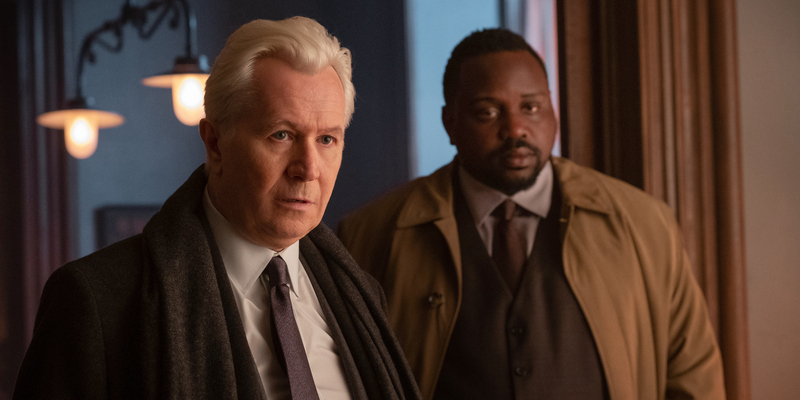
Review by
Eric Hillis
Directed by: Joe Wright
Starring: Amy Adams, Gary Oldman, Anthony Mackie, Fred Hechinger, Wyatt Russell,
Brian Tyree Henry, Jennifer Jason Leigh, Julianne Moore

Movies like Body Double, Road Games and Disturbia have successfully
managed to rework the template of Alfred Hitchcock's classic thriller
Rear Window. Others like the recent
The Girl on the Train
have floundered in attempting to draw inspiration from the Master of
Suspense. It's into this latter category that director Joe Wright's troubled adaptation of AJ Finn's novel
The Woman in the Window falls.
Opening with Hitchcock's film playing on a TV in the apartment of its
heroine, Wright's movie certainly isn't trying to hide its influence. In
fact, thanks to said gogglebox, we're presented with numerous clips from
the sort of classic thrillers Wright is hoping to ape here – Otto
Preminger's
Laura, Hitchcock's Spellbound, Delmer Daves' Dead Reckoning – though curiously not the
movie Wright's film owes the heaviest debt to, Hitchcock's
The Lady Vanishes (and unlike say, the protagonist of Dario
Argento's Do You Like Hitchcock?, here our heroine's obsession with old movies never plays into the
plot).

Like that 1938 film (still the most successful example of a screen
translation of the classic "Vanishing Lady" urban legend),
The Woman in the Window sees its heroine, agoraphobic
shut-in Anna (a dressed down and dowdy Amy Adams), befriend a
woman, Jane Russell (Julianne Moore rehashing her brassy Bostonian
shtick from TV sitcom 30 Rock), who subsequently goes missing.
As this storyline is wont to go, everyone denies ever seeing Jane. The
twist here is that, Rear Window style, Anna witnessed Jane's
murder from across the street. Then, just as we recently saw in another
bad thriller, George Clooney's
Suburbicon, the murdered Julianne Moore is replaced by another woman, though here
it's not Moore playing a second character, but rather
Jennifer Jason Leigh who claims to be Jane Russell. Leigh's role is
particularly thankless, as she exists to speak the words "I'm Jane
Russell" and little else.

The main suspect is Russell's sinister husband. He's played by
Gary Oldman, who clearly can't be bothered to make any effort here,
and honestly, who can blame him? It reaffirms Oldman's growing status as
the worst great actor working today. He seems to be channeling David
Thewlis here, but he never quite nails Thewlis's unique sneer. A secondary
suspect is Anna's tenant David (Wyatt Russell), a womanising
singer-songwriter who lives in her basement and is prone to temper
tantrums. Or perhaps Anna is imagining all this herself, or maybe she even
killed Jane. Ultimately, the movie seems to roll a dice to decide who's
responsible, leading to a laughably terrible climax that would be more at
home in a Scream sequel.
The Woman in the Window's production troubles have been well-documented, with writer
Tony Gilroy brought in for an uncredited rewrite to try and make
sense of playwright Tracy Letts' script (Letts also appears as
Anna's psychiatrist). Whatever additions Gilroy made, they sure didn't fix
anything. As you might expect from Letts, the film has a theatrical feel,
and it's drowning in exposition, with several cheap devices employed to
allow Anna to verbalise her state of mind, such as her meetings with her
shrink and phone conversations with her estranged husband (Anthony Mackie).

Wright's film may well serve film professors who wish to contrast it with
the brilliance of Rear Window. While Hitchcock uses his camera to tell the story, Wright relies on
clunky dialogue. Watch the opening of Hitchcock's film, in which we get to
know the residents of the apartments across the street from Jimmy Stewart
by simply observing them. Then watch the scene near the beginning of
Wright's movie, in which Anna tells her shrink about the various people
she's been essentially spying on. Hitchcock SHOWS us what we need to see,
while Wright TELLS us what we need to hear. That's because Hitchcock was a
visual storyteller while Wright, while being something of a visual
stylist, is clueless as to how to tell a story with images. Sure, there
are lots of gimmicky visual touches here, but none of them actually serve
to advance the narrative. Tell me again why Brian De Palma can't find work
in Hollywood?
The only bright spark here is Adams, who, God love her, really does her
best to add some depth to the proceedings. As we saw with Emily Blunt
in The Girl on the Train, here we have an actress delivering a performance the film doesn't
deserve. Just as Anna is advised to forget everything she believes she
saw, you're best pretending you never witnessed this disaster.

The Woman in the Window is on
Netflix now.

